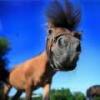Sorry vegetarians. You were evolved to eat meat, just like cats and dogs.
Maybe you were evolved, but I have evolved, and there are no signs the evolution in humans has completely stopped, although there have been some notes that it has somewhat slowed down. Your argument is in the same ballpark as "where do you vegetarians get your protein from".
I do not dispute your choice to prefer meat, as you would not normally dispute the eating habits of the others. Thanks to subtle differences in the personal genetic makeup, some people naturally can't be vegetarians, the same is true in the inverse direction, too. There is no conclusive evidence, which of the two, meat or veggies, is ultimately healthy and leads to immortality. Most likely, none. Some thrive on eating meat, whilst the others - not so; the opposite is also true. As someone who supplements your meat diet with a sizable stack of supplements, you can't assert that what you perceive as the benefits of your meat rich diet alone is purely because of your diet. Besides, if a meat eater can supplement, why a vegetarian can't. It is true, though, that many vegetarians live off health detrimental diets rich in grains/simple carbs and deprived of other things vital, e.g. the right fats.
The bottom line, I think, is that any diet has to be carefully composed for that particular person in question and has to take into consideration variations in the genetic makeup. The diet that is good for me might not necessarily be good for you, and the other way around. I define "good" as in having good biological markers that come out of the annual blood test, plus the perception of the general well-being.
Evolution would not have adjusted to people becoming vegetarians in the last 10,000 years. And, all indications/research shows that a vegetarian diet is less healthy than a paleo-style diet. Quite simply, carbs = sugar, and sugar is a pro-aging "nutrient". It creates more metabolic waste than fatty acids, and creates more glycation issues.
The evolution is an ongoing process, and a 10000 year span is barely enough to assert the results of it.
An excess of fast and nutritionally void carbs is a big issue, this is something I agree with you wholeheartedly. However, no-one forces me eat carbs, it is me who decides what I am going to eat and what I am not going to eat.
Also, if glycation is the main issue with the vegetarian diet, what is the main reason you supplement your paleo style diet with a stack of antiglycation supplements? Is there anything you are particularly worried about?
One of the most important and revealing commonalities in people living post-100 is that they have low fasting insulin levels, which generally means they have not had a carb-rich diet -- in fact, none are vegetarians.
There exist no statistically important examples of any modern population, members of which have repeatedly reached 100+ life spans living purely off a paleo style diet. Please correct me otherwise.
1) A topic, beaten around here to death, of Okinawans, is quite revealing in that that their daily diet is mostly composed of rice, seafood, vegetables, is low in meat, is not a paleo style diet, is largely devoid of degenerative age related disease and results in a longer life. 2) Stephan, over at the Whole Health Source blog has examined in pretty great details several isolated cultures in
Melanesia,
Papua New Guinea and Central Africa whose diet is almost exclusively based on starchy tubers with some seafood thrown in. Those cultures are completely devoid of degenerative age related diseases that have plagued the Western civilisation, including CVD you so often seem to appeal to.
I have good reasons to believe that the insulin issue is more complicated than you would like me to think, and is not the only key to good health and longetivity. Restricting the carbohydrate intake appears to be quite important for an average person with no specific pre-existing health conditions, but it does not appear to be the only key to a long life span.
Humans became human thanks to energy- and nutrient-rich animal-source foods, especially highly fatty, nutrient-soaked organ tissues. Pre-agricultural humans and our recent hominid ancestors greatly preferred fatty organ means, like livers, brains, bone marrow, versus muscle meats, which were seen as far less important to eat and probably handed down to the least important people in a tribe.
Proponents of the paleo diet tend to somehow forget that finding food 40000-10000 years ago was nothing like walking into an organic meat market or shopping around at the meat section in the local supermarket. Killing an animal back then was not such a frequent occasion, and the tribe would eat every single part of the animal not because of their advanced nutritional knowledge, but because the prospect of killing another animal was vague, especially in winter. The time in between they would, perhaps, spend foraging for whatever else they could find to eat to survive. Many of our ancestors would starve and die because of the food scarcity; the average life span back then was more close to 18 years rather than to 100+.
Eating meat, in the evolutionary perspective, was critical back then for survival and competition amongst related species, however we have come a long way, have learned a lot and can do better now.
To choose to eat a vegetarian diet now goes against your genetic coding. This is why babies die when only fed a vegetarian diet.
Genetic coding codes us for 20 (22) amino acids, not for their source.
The case of babies who died on a vegetarian diet, I believe you appeal to, was a case of an irresponsible, religiously vegetarian couple who deprived their baby of the mother's milk and fed the baby with apple juice and soy milk. Whether because they were ignorant or uneducated, the fact their baby has died was a terrible thing to happen, however, it is not a common place amongst vegetarians.
There are far more cases when irresponsible non-vegetarian parents have tried to feed their babies with junk food, e.g. hamburgers from McDonald's.
Now that vegetarianism has been around as a fad for 20+ years, there are several recent books from long-time vegetarian practitioners who've come back to eating meat because their health couldn't take it anymore. An example is, The Vegetarian Myth.
The fad, as of recent, has been eating junk food, an excess of fast and nutrionally devoid carbs, "healthy fat free" foods and pigging out on sugary sweets, which equally applies to vegetarians and non-vegatarians.
The fats especially, in plant foods, are inflammatory to humans, and are pro-aging to our cells. Meanwhile, saturated fat, which doesn't oxidize (which is why it doesn't need to by hydrogenated or kept in the fridge) is extremely stable in our body, and also used as a clean-burning fuel source.
You tend to generalise quite a bit. Not everything that grows should be eaten. If you eat a death cap, you will die. If you do not prepare your fugu properly, you will die. It is all about the knowledge and applying the knowledge.
The issue of unhealthy plant fats has been beaten to death around here. No, not every plant oil should be consumed, and plant based saturated fat is easily available in the form of coconut and red palm oils.
There are no humans that can survive on a non-supplemented vegetarian diet for anywhere close to their full lifetime. And those who try, pay a price.
I will venture out on saying that nowadays it is hard to survive on a non-supplemented diet for non-vegetarians as well.
Meat, which the majority of people buy at the local supermarket, almost certainly comes from the grain or soybean fed cattle with the skewed nutrional and fat composition, and, most likely, laced with growth hormones, which is radically different from what our ancestors used to get from the wild meats. You would be getting same inflammatory oils through the grain the cattle has been fed with. Even buying organic meat does not guarantee you will be getting a favourable nutrient compostion, as large supermarket chains now also want to get their share of the organic cake and they buy their organic meats from farmers who feed the cattle with the certified organic grain. Which is still grain, nevertheless. You can only be sure that you are getting all your nutrition if you can trace your grass fed animal back to a trusted local farmer where you can actually see the cow that will end up on your dinner plate. Grass fed meat is significantly more expensive and less convenient to get, so most people will pass it either cluelessly (not knowing the difference in meat of grass and grain fed animals) or because they simply want to eat meat cheap, which is a prevailing occurrence. Raising the grass fed cattle in an industrial world with an ever growing population does not seem to be practical, either; at least at the moment.
Whilst on the topic of supplementation, considering your paleo diet, do you supplement magnesium? If you do not, where do you get it from?
Edited by inkyoto, 24 November 2011 - 03:14 PM.



















































